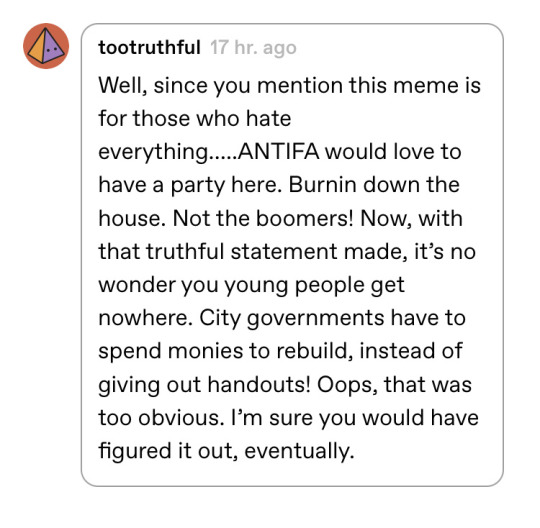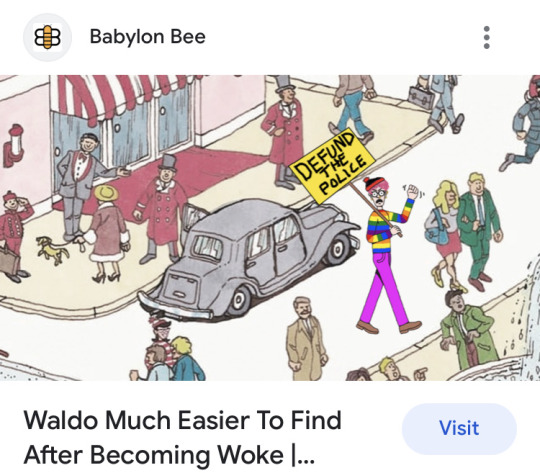#we are like “conservatives are bad because of their bigotry and rigid traditional beliefs”’
Explore tagged Tumblr posts
Text

Lmao what

I love this it’s like a where’s Waldo for bitter people who hate everything.
I know there was an ironic picture very similar to this going around this sight a while ago that got mistaken for being unironic, and this seems to be different(I reverse image searched this to try and make sure I didn’t repeat my mistake from a few posts ago, and I actually found a bunch of really cute similar-looking drawings that were not all about how bad it would be for liberals to get their way, so I recommend doing that. I also found this brilliant joke from the Babylon bee:)

5/10 because the drawing is cute regardless of its boomer-ness…. And only 1/10 for the Babylon bee, but only because they made Waldo based and epic. I wish they had gone to the effort of having someone draw him the way he actually looks in the real books, though.
Anyway, tag yourself! I’m the stoner kid on the skateboard.
#my first hate mail#love you king#speaking as antifa I *would* love to have a party there#smoking pot#making out with dudes#burning the American flag#cloning people?#burnin down the house 💁🏻♂️✨#conservative are so boring#also not to be serious for a second but how do conservatives like this keep accusing us of being the unreasonably violent ones when th#they literally did an insurrection????#we may break some windows but couldn’t be us storming the capitol#we are like “conservatives are bad because of their bigotry and rigid traditional beliefs”’#and they’re like ‘liberals are bad because they take money from the government to eat food and are gay’#anyways
116 notes
·
View notes
Link
(...)
I was a 12 years old when I was attacked by a mob of children and called "Christ killer" — the same age Jesus was, according to the Gospel of Luke, when he lingered in the Temple of Jerusalem and impressed the elders with his intellect — so this issue is undeniably personal. That wasn't the first or last time I was bullied for being Jewish, but it was the only time I nearly died because of it: Those kids held my head underwater, chanting, "Drown the Jew!"
This incident sprang back to mind this month as Republicans tried to figure out what to do about Greene, a particularly obnoxious Christian right-winger who has suggested that a "space laser" affiliated with Jewish banking families caused the 2018 Camp Fire in California, expressed sympathy for the anti-Semitic QAnon fantasies, promoted a video that claimed Jews are trying to destroy Europe, posed for a picture with a Ku Klux Klan leader and liked a tweet linking Israel to the assassination of John F. Kennedy.
(...)
None of this is surprising for anyone who is familiar with the history of American anti-Semitism. Greene is not an aberration, some inexplicable pimple of hatred that blemishes the American right's otherwise Jew-friendly visage. The American right has long had an anti-Semitism problem, and she's just the latest symptom.
This history of hatred "tells us much more about the anti-Semite than it tells us about Jews," Dr. Jonathan Sarna, a professor of American Jewish history at Brandeis University, told Salon. After citing an Israeli historian who refers to anti-Semitism as a "cultural code," Sarna explained that beliefs that vilify Jews as malevolent plotters who secretly control the world have a long history in American political life. "These ideas, which I think many on the left frankly had thought were done and over with, we suddenly see them full blown," he said
Before the 19th century, Sarna explained Jews were stereotypically depicted as being cursed: They were "wandering Jews" for their supposed role in killing Jesus Christ. In the modern era, however, the stereotype emerged that Jews secretly controlled the world and were responsible for everything that a given anti-Semite might regard as sinister. During the Civil War, Gen. Ulysses S. Grant blamed the Jews for cotton smuggling and expelled the entire Jewish community from areas he controlled in Kentucky, Tennessee and Mississippi. When the populist movement arose to address agrarian economic concerns in the 1890s, Jewish bankers like the Rothschilds were a frequent target among ideological leaders like William Hope "Coin" Harvey.
(...)
There's a direct line between those conspiratorial fantasies ideas from previous decades and the anti-Semitic attacks of the 21st century. "Conspiratorial thinking, by its nature, argues that everything is connected," Sarna explained. "There are no coincidences and it eschews complexity. It believes there are simple explanations based on sinister individuals who are manipulating the universe. Unsurprisingly, in a Christian setting, those are Jews."
Those ideas can evolve — Sarna pointed out that the QAnon belief in a giant child abuse ring run by Jews is analogous to the "blood libel," the medieval myth that Jews used the blood of Christian children for rituals — but the underlying assumptions have been consistent. It just so happens that, in the modern right-wing incarnation, Donald Trump's cult-like following believes that "all the enemies of Mr. Trump are now child molesters."
(...)
[Jewish comedian Larry Charles] brought up community organizer and political theorist Saul Alinsky, a favorite target of the right. "He is almost like the devil in a way," Charles observed. "He's like this radical leftist Jew, he fits all the categories. He checks all the boxes."
"Shooting some of these movies, we would see reasonable people who have this blind spot," Charles said. "They have this crazy belief, and there were all different applications and manifestations of it, that the Jews control everything. That is like a mantra amongst a certain segment of the population."
(...)
With the election of Trump in 2016, those ingrained belief systems — which for many years had been kept outside the American political mainstream — became more prominent, and their adherents more emboldened. David Weissman, a military veteran and former conservative Republican who stopped being a self-described "Trump troll" after a 2018 conversation with comedian Sarah Silverman, told Salon about his encounters with anti-Semitism on the right.
Back when he still supported Trump, Weissman recalled, he got into a "little spat" with an alt-right commentator who calls himself Baked Alaska, who was recently arrested after the Jan. 6 Capitol riot. Ultimately they moved past it, Weissman said: "We both realized we were Trump supporters" who believed "Democrats were the bad guys." Once he left MAGA world, however, Weissman said "the anti-Semitism definitely escalated" in interactions with his former allies.
"When I became a Democrat, I was called 'the k-word'" and targeted by "anti-Semitic slurs and tropes," Weissman said. Trump supporters sent "memes of me being Jewish in the oven," and "put my name in parentheses," a common tactic used by the far right to target someone for being Jewish.
(...)
"Anti-Semitism certainly did not start with Marjorie Taylor Greene, nor did it start with Donald Trump, but we have seen an exponential increase in violent anti-Semitic incidents during Donald Trump's presidency," Halie Soifer, CEO of the Jewish Democratic Council of America, told Salon. "That is no doubt related to the fact that he emboldened and aligned himself with white nationalism." She mentioned Trump equating the neo-Nazis in Charlottesville with the peaceful protesters by "commenting that there were very fine people on both sides," refusing to denounce white nationalism and telling the right-wing Proud Boys during one of the campaign debates to "stand back and stand by."
"White nationalism had existed in our country prior to that, and anti-Semitism as an element of it, but white nationalists had never had an ally in the White House until Donald Trump," Soifer said.
(...)
Donald Trump's supposed pro-Israel policies were closely aligned with those of Benjamin Netanyahu, and did nothing to correct for Trump's history of anti-Semitic words and actions. He accused Jewish Democrats of "great disloyalty" toward Israel (feeding into the stereotype that Jews have dual loyalties), removed any specific reference to Jews from a 2017 State Department statement on Holocaust Remembrance Day and has frequently used anti-Semitic dogwhistle terms by opposing "globalists" and describing himself as a "nationalist." When I interviewed Charlotte Pence, the daughter of former Vice President Mike Pence, she talked about her family's love of Israel but refused to answer a question about whether she believes Jews are going to hell — or discuss the creepy messianic theories underpinning the Christian right's support for Israel.
When I asked Larry Charles whether, based on his experiences, there's an opportunity to build bridges with anti-Semites, he was skeptical. "I have not seen a lot of opportunities for bridge building in the situations that I've been in," Charles explained. "The people that I've met through Sacha [Baron Cohen] were very rigid and dogmatic in their prejudices. There was no crossing that gulf with them. There might be tolerance, temporarily. There might be patience, temporarily. But there's no changing that belief."
I hope that Charles is wrong but suspect he is right, which raises the question of how American Jews should react to the Marjorie Taylor Greenes of the world. For want of a better alternative, I think the only solution is to be intolerant toward intolerance. House Democrats were right to strip Greene of her committee assignments, but that is not nearly enough. Social media platforms like Facebook and Twitter need to do more to limit hate speech, even if conservatives cry foul in bad faith (the First Amendment only protects people from government censorship, not consequences from private corporations). Right-wing politicians who attack prominent Jews in ways that can be plausibly construed as anti-Semitic, or by denouncing "globalists," need to lose their funding. People who oppose anti-Semitism must lead boycotts against right-wing media figures who cover for people like Greene, such as Fox News' Sean Hannity.
On a broader level, critics of anti-Semitism must recognize that this form of bigotry is part of America's long history of hate — a history which holds that only white, straight Christian "manly" men have a right to rule — and recognize our responsibility to be allies to African Americans and the Latinx community, Muslims and the LGBT community, women suffering under the patriarchy and the poor struggling to make ends meet. If we limit our empathy merely to other Jews, the implicit message is not that systemic oppression is wrong, but only that we happen to dislike it when our group is targeted. The Jewish tradition at its best instills a moral responsibility to see all the layers of oppression, and align ourselves with its victims.
[Read Matthew Rozsa’s full piece in Salon]
137 notes
·
View notes